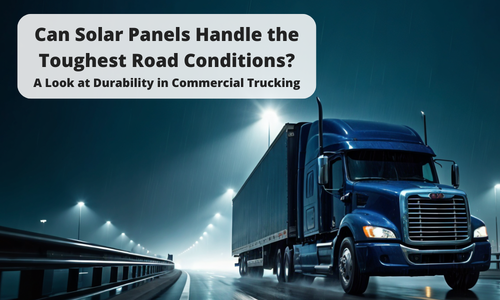Can Solar Panels Handle the Toughest Road Conditions? A Look at Durability in Commercial Trucking

When fleet managers consider adding solar panels to their trucks, one of the first questions they ask is whether the panels can withstand the wear and tear of the road.
It's a valid concern for commercial trucks that log hundreds of thousands of miles under harsh conditions—constant vibration, extreme weather, and exposure to dirt and moisture.
Unlike traditional rooftop solar installations, solar panels for commercial trucking must endure relentless movement, temperature fluctuations, and road debris without compromising performance.
Take this blog post with you!
Fortunately, advancements in solar technology have made this possible.
In this post, we’ll explore:
- How solar panels are designed to withstand the most demanding road conditions.
- What makes commercial trucking solar panels durable?
- Why solar panels are a reliable solution for fleets looking to improve efficiency and reduce operating costs.
The Durability Concerns: Why Fleets Worry About Solar Panels

Fleets interested in solar often have concerns about whether the panels can handle the realities of life on the road.
Unlike a fixed solar installation on a building, truck-mounted solar panels are constantly exposed to conditions that can lead to wear and failure if not correctly designed.
Some of the most common concerns include:
- Vibration & Shock: Trucks experience continuous vibration, especially on rough roads or during long hauls. Poorly designed panels could crack, delaminate, or experience electrical failures over time.
- Moisture & Water Resistance: Trucks frequently operate in rain, snow, and high-humidity conditions. Without proper sealing, moisture can seep into panels, causing corrosion and reducing efficiency.
- Extreme Temperatures & UV Exposure: Truck-mounted solar panels must perform across a wide temperature range from freezing winters to scorching summers while resisting UV degradation.
- Debris & Road Grime: Mud, dust, salt, and debris kicked up from the road can coat the panel’s surface, potentially impacting performance if the panel lacks proper protection.
These concerns are valid, but modern trucking solar panels are engineered to overcome these challenges.
How Solar Panels Are Designed for Harsh Road Conditions
To withstand the daily stresses of life on the road, solar panels for commercial trucks utilize rugged, flexible designs and advanced materials that enhance durability.
Here’s how they are built to last:
1. Flexible vs. Rigid Solar Panels: The Best Choice for Trucking


Traditional glass-covered solar panels are too fragile and heavy for commercial trucking.
Instead, lightweight, flexible solar panels are the preferred choice because:
- They are resistant to cracks and fractures, unlike rigid panels.
- They conform to the truck’s surface for a low-profile installation that reduces wind resistance.
- They are significantly lighter, which helps maintain fuel efficiency.
For a comprehensive understanding of how solar panels can enhance various truck systems, refer to The Fleet Manager's Guide to Solar Power: 5 Key Applications for Commercial Trucks.
2. Encapsulation Materials Protect Against Moisture and UV Damage
![]()
![]()
High-quality solar panels use advanced encapsulation materials like ETFE, which provide a waterproof barrier and prevent moisture ingress that could damage internal components.
ETFE also has self-cleaning properties, meaning the surface remains unimpeded by road dirt and grime, producing more power than panels with inferior encapsulation.
These materials also:
- Shield solar cells from UV degradation, ensuring long-term performance.
- Resist damage from road salt and diesel exhaust.
- Maintain flexibility without cracking over time.
3. Vibration Resistance: Engineered for Constant Movement

PowerFilm’s solar panels are designed to endure continuous vibration without performance degradation.
This is achieved through:
- Whole-cell Maxeon crystalline silicon cells are more robust than the brittle crystalline structure in traditional panels.
- Robust adhesion methods ensure a secure, long-lasting bond to the truck’s surface.
- Edge-sealed designs that prevent peeling and premature wear.
By combining these durability-focused design elements, solar panels for trucking can withstand the harshest road conditions without failure. For more on why Maxeon’s rugged cell design delivers unmatched reliability in mobile and off-grid environments, check out our deep dive into Maxeon solar cells.
Real-World Testing and Proven Performance

Solar panels for commercial vehicles undergo rigorous testing to ensure they can endure real-world trucking environments.
Industry Testing Standards for Durability
High-quality solar panels for trucking meet stringent durability tests, including:
- Thermal cycling tests that simulate extreme hot and cold conditions.
- Vibration and shock tests, ensuring resilience under constant movement.
- Ingress protection (IP) ratings verify dust, moisture, and water intrusion resistance.
The Long-Term Benefits for Fleets
Investing in durable, truck-ready solar panels brings long-term advantages beyond just reliability.
1. Reduced Maintenance Compared to Traditional Power Sources

Solar panels eliminate the need for frequent generator and tractor engine maintenance and reduce strain on alternators, leading to fewer breakdowns and lower maintenance costs.
2. Extended Battery Life & Reduced Idling
![]()
Solar panels prevent deep discharges and extend battery lifespan by providing a consistent trickle charge to truck batteries, helping fleets avoid costly jump-starts and replacements. For a deeper dive into how solar keeps batteries charged and ready, check out our blog post on starting battery reliability.
3. Improved ROI with Long-Lasting Solar Technology

Because high-quality trucking solar panels are built to last, fleets experience a strong return on investment over time, with:
- Lower fuel costs due to reduced idling.
- Extended battery and electrical component lifespan.
- Reliable power for auxiliary loads without engine runtime.
For detailed information on enhancing APU efficiency and achieving cost savings, refer to Boost Your Truck’s Diesel or Electric APU Efficiency and Save Money with Solar Panels.
The Bottom Line
Commercial trucking solar panels handle vibration, extreme weather, and road debris without compromising performance. Thanks to flexible, rugged materials and rigorous testing, these panels provide long-term reliability for fleets looking to reduce costs and improve efficiency.
Want to see how solar can benefit your fleet? Read our Fleet Manager's Guide to Solar Power or contact us today!
Take this blog post with you!